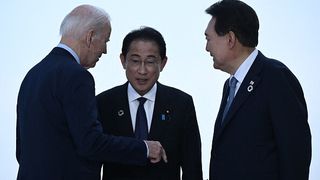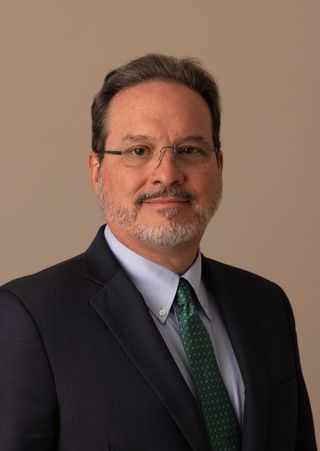On 18 August, President Joe Biden will host Japanese Prime Minister Kishida Fumio and President Yoon Suk Yeol of the Republic of Korea at Camp David for the first standalone trilateral summit between the three leaders. The summit is earmarked as an opportunity to celebrate a “new chapter in their trilateral relationship,” building on the recent uptick in the tempo of high-level meetings, joint military exercises, and data-sharing efforts between the three countries.
United States Studies Centre CEO Dr Michael Green discusses the significance of the summit, and the future and challenges facing the three countries’ trilateral efforts.
Could you shed some light on the significance of the unprecedented cooperation between Japan and South Korea? How are shared threats thawing hostilities between Seoul and Tokyo?
The Japan-Korea strategic reconciliation ranks alongside AUKUS in terms of its importance to the geopolitics of the Indo-Pacific. The most brutal wars in Asian history have, more often than not, resulted from contests for control of the Korean Peninsula. Chinese hegemonic ambitions for the region rest on influence in Southeast Asia and weaning South Korea away from the US alliance system—and ultimately controlling unification with the North on terms that are favourable to Beijing. The political tensions between Tokyo and Seoul and the two previous Korean governments’ reticence about embracing an Indo-Pacific strategy seemed to signal that Beijing’s strategy was working. But it is clear that, at least for now, the Chinese approach has backfired. Beijing’s economic embargo against Korea and enabling of North Korean provocations have driven the Korean public to view China with the same alarm as their Japanese neighbours. So yes—there is greater alignment of threat perception than we have seen in many decades. Political leadership by Yoon, Kishida and Biden has been crucial, and different leaders might not do the same in the future, but the summit really matters.
Washington is reportedly angling for the summit to bring a joint statement on trilateral defence cooperation. Could you provide some insight as to why this would constitute such a landmark achievement? Given the US-Japan security treaty does not allow for trilateral collective defence, what form could the deepened defence cooperation take?
In 2010 North Korea ambushed and sank the South Korean corvette Cheonan. Koreans were outraged, especially after then Chinese president Hu Jintao ignored South Korean entreaties and held a summit with Kim Jong Il. That December there was a trilateral meeting in Washington among US Secretary of State Hillary Clinton, Japanese Foreign Minister Seiji Maehara and Korean Foreign Minister Kim Sung-hwan. Early drafts of their joint statement included a collective security statement that an attack on any one of the three would be viewed by the other two as an attack on them. At the last minute the Korean side got cold feet, but the same sentiments are now fueling Korea’s approach to the summit and I would look for a resumption of that theme (noting that it would be a political statement and not a binding treaty per se).
While North Korea’s escalating provocations have been the strongest impetus for boosted trilateral ties, at the summit the leaders are set to discuss expanding cooperation “across the Indo-Pacific and beyond.” What are the key policy divergences that could hamper efforts to advance a unified trilateral vision beyond responding to North Korean aggression? For example, what issues might the leaders face in calibrating their respective countries’ positions on China?
The Yoon administration has issued an Indo-Pacific Strategy and sent significant contingents to Talisman Sabre, so the trilateral summit is part of a larger suite of new activism by Seoul to shape the strategic environment in the region and deepen partnerships—especially with Australia. The obstacles in my view are less about differences among the three governments at present but rather the differences within Korea. The progressive camp in Korea is more skeptical about Japan and strategic competition with China, and at some level its alliance with the United States. In that sense they have diverged from the broad mainstream views of the Korean public, but their political clout could increase in National Assembly elections because of other unrelated issues. It will be important for Japan and the United States to help Yoon build bipartisanship behind trilateralism within Korea to sustain this progress.
USSC Insights is curated by Research Associate Ava Kalinauskas.






